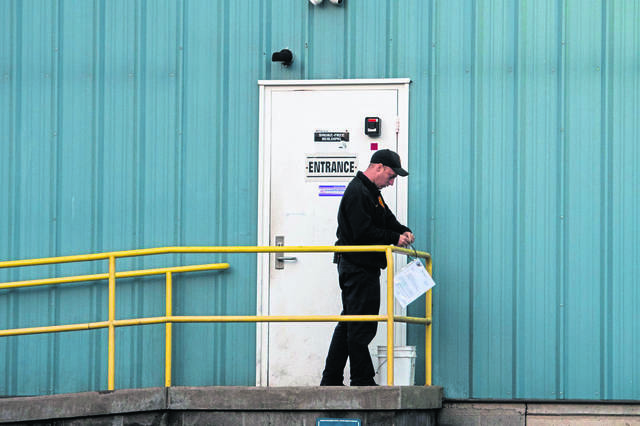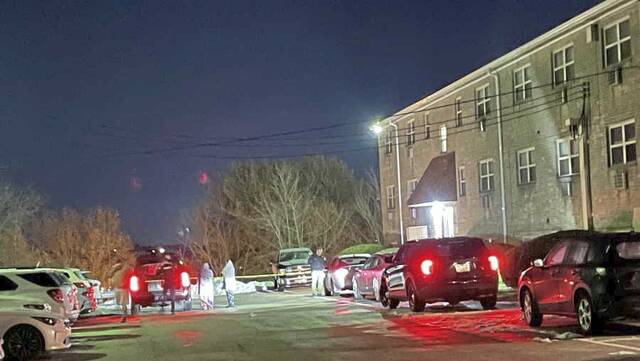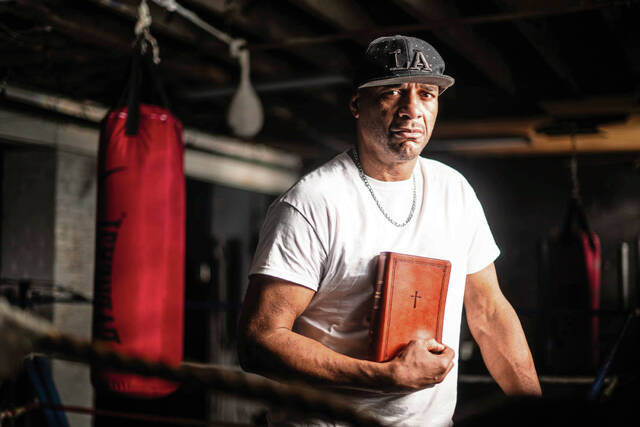Former employees at a Jeannette hemp-drying facility said they worked in unsafe conditions, dealing with thousands of pounds of mold-infested crops.
Richard Wright said employers denied his request to shut down production long enough to address the problem.
“I just don’t want my name associated with making anybody sick,” said Wright, 32, of Webster, who worked in quality control.
Tyler Dickinson, chief operating officer of facility owner Patriot Shield, acknowledged the mold problem but denied its severity.
“Mold is an inevitable quality-control issue when dealing with any agricultural commodity,” he said via email. “Mitigation efforts have always been in place and have been deemed adequate.”
Unsafe working conditions are one of many accusations levied against Patriot Shield, which is under scrutiny from the U.S. Department of Labor, the state Department of Environmental Protection and Jeannette city officials.
Its issues highlight the lack of regulation in Pennsylvania’s nascent hemp industry.
New crop, new rules
Large-scale hemp production was illegal in the United States until the passage of the 2018 Farm Bill, which legalized the plant for the first time since the 1930s. Previously, hemp was treated the same as marijuana. Both are varieties of the cannabis plant.
Pennsylvania already allowed some small-scale hemp operations under a research pilot program prior to the Farm Bill, and the state was quick to open the door to farmers once federal restrictions were lifted.
Advocates see a host of potential uses for hemp.
Cannabidiol, more commonly known as CBD, is used in many health supplements. The durable plant can be used in construction materials. At Patriot Shield’s Jeannette facility, hemp flowers are dried to produce a smokeable alternative to marijuana.
Farmers are required to get a permit from the state Department of Agriculture before they can grow hemp. Processors — which turn the raw crop into other products — don’t need one.
Most states require processors to get a license, said Erica Stark, executive director of the National Hemp Association and the Pennsylvania Hemp Industry Council.
The Department of Agriculture inspects hemp crops to make sure they meet regulations. There’s no agency responsible for whatever happens next.
“There’s no oversight of it, once it’s cleared to leave the farm,” Stark said.
Patriot Shield under scrutiny
Wright is a true believer in the benefits of hemp and marijuana.
He grew up in Southwestern Pennsylvania, moving to California in 2010 to work as a grower in the marijuana industry.
He heard about Patriot Shield this fall, soon after he had returned home. At first it seemed perfect — a way to bring his cannabis expertise to his home state.
“It’s like a godsend; I couldn’t believe it,” he said. “I can make a life here and take care of my family.”
However, he quickly came to believe that Patriot Shield’s leadership had an “utter lack of experience and knowledge of the industry.”
Mold was everywhere, and cross-contamination was common, with various “rooms” in the facility separated only by sheets of black plastic. Employees were given surgical masks, according to Wright.
Cody Kull, former security officer for the facility, said mold was “rampant.”
“I was actually instructed to specifically make sure that only particular people had access to those areas where that defunct product was stored,” said the 30-year-old from Loyalhanna.
Meanwhile, residents living near the warehouse complained about the marijuana-like smell. Jeannette officials said Patriot Shield was operating without an occupancy permit. The city issued a temporary permit but ordered the facility to stop operations last month because of the odor complaints.
Officials rescinded the order a few days later, saying they were working with Patriot Shield to resolve the problem, but issued another cease-and-desist as complaints continued.
The DEP issued its own order last week, prohibiting the company from operating until it resolved the odor issues and acquired DEP permits.
In October, employees started protesting, saying they had not been paid in weeks. They still have not received checks. The federal Department of Labor is investigating.
Kull said his first paycheck was late, but he was willing to give Patriot Shield the benefit of the doubt.
“I was a little skeptical but still on board, because I realized it was the infancy of a new operation; things are going to happen,” he said.
His skepticism deepened as the issues dragged on. The company prioritized pay for security personnel, so he did eventually get his money, even when other employees did not. However, he said the company owes him more than $1,000 for security contracting work he did outside of his daily duties, money that is long overdue.
Kull said he was fired in late October.
Wright said Patriot Shield fired him for theft. Wright admitted to taking some hemp from the warehouse, though he believes he was justified in taking it in recompense for the lack of pay.
Dickinson said the company is working to resolve all of its issues.
“It has been a turbulent first year of business for this start-up, and we are continuing to work diligently on getting caught up, as we are committed to the city of Jeannette as a home base of operation,” he said via email.
Calls for regulation
Most hemp products are in a regulatory gray area because the industry is so new, but the rules for smokeable hemp are particularly hazy, Stark said. No state or federal agencies oversee the product.
“Once the hemp leaves the farmer’s field, it is no longer under (U.S. Department of Agriculture) jurisdiction, and it’s not under (Food and Drug Administration) jurisdiction because it’s not a food and it’s not a drug,” she said.
She testified to state lawmakers last month, saying Pennsylvania should move to regulate processors. At the federal level, she believes the Bureau of Alcohol, Tobacco, Firearms and Explosives would be the best choice to regulate smokeable hemp.
State Sen. Kim Ward, R-Hempfield, said the Patriot Shield situation highlights the need for legislative action.
“This company was in violation of existing laws already,” she said. “It does bring to the surface a problem that needs to be reevaluated.”
State Rep. Eric Nelson, R-Hempfield, said lawmakers may need to look into the issue to see whether steps need to be taken, though he doesn’t want to rush to add more regulations to a new industry.
“Is there a gap that’s putting people at risk, or does government not need to step in because there’s existing programs that are already in place?” he said.
Ward said she would support a law requiring permits for processors.
“Sometimes you don’t know you have a problem until one arises, and it looks like we may have a problem here,” she said.








